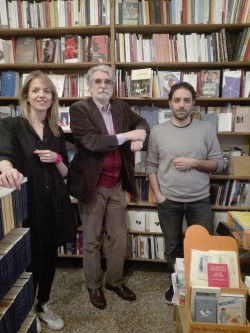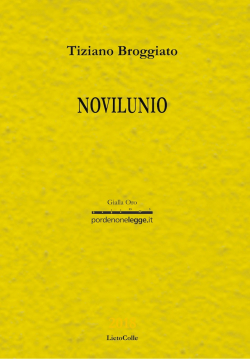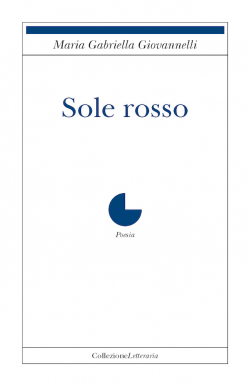a rounded ray appeared
by Cristina Bove
a rounded ray appeared
a moon on the porch of the sky
it made the night less of a night
the capsized abyss was teeming with stars
and god was proud to be God
giving birth to breath and light
emitting the sun between morning and night
to let the soul of the world blossom
pierced like butterflies
on the board of darkness
his creatures
accepting their own ephemeral existence
sometimes hold out against death
poets for a moment
returned to the heart of the Eternal
THE BOOKSHELF OF POETRY AT THE LIBRERIA POPOLARE DI VIA TADINO, MILANO
by Francesca Del Moro
The Libreria Popolare di Via Tadino was founded in Milan in 1974 by a group of intellectuals—Mario Cuminetti, Lucia Pigni Maccia, Camillo de Piaz and David Maria Turoldo, among others—all of them coming from the previous Bookshop Corsia dei Servi. For over twenty years, the Libreria Popolare livened up Milan’s cultural life, focusing the debate on social, political and religious themes. In the 1990s, after the passing of its founders, the bookshop was taken over by CISL trade union, which had been involved in its collateral activities since the beginning. In 2009 the bookstore became property of the Libreria Tadino cooperative and part of Milan’s independent booksellers’ network. The Libreria Popolare di Via Tadino has always paid special attention to poetry, hosting around 700 titles on its shelves and especially focusing on contemporary authors and high quality small publishers. The bookshop also hosts about 3-4 poetry readings and book presentations every month. For this ILLUSTRATI issue, the booksellers Guido Duiella, Antonio La Gamma and Michaela Molinari have chosen and commented the books Novilunio (New Moon) by Tiziano Broggiato and Sole Rosso (Red Sun) by Maria Gabriella Giovannelli.
Libreria Popolare di Via Tadino, Via Alessandro Tadino 18, Milano - facebook.com/libreriapopolare
Novilunio
by Tiziano Broggiato
A daily moon was hovering behind
the undamaged Porta Romana, in Noto
like an epiphany.
Tiziano Broggiato’s poetry expresses itself by means of disorientation and infraction: in this book, such existential unease shows itself bare and complete as it deals with life’s crucial crossroads, which are essential for the poet but also for anyone who wants to place themselves on the side of questions and queries—from advancing age to the frightful sensation of a community coming to its end, from the almost manic observation of the little big world around us to the race towards a happiness which is hard to reach, from the search for affection to the quest for a higher spirituality, from the struggle of many people to survive day by day to the gaze turned towards the faces of those close to us. The new moon of the book’s title exactly represents the moment of almost indefinable transition that lies at the base of any human research—be it spiritual or worldly—and suggests the author a multitude of topics for discussion, the only connecting theme being an undeniable vocation and the belief in poetry. But a new moon also means a break in the darkness and a renewed light, leading to a change that let “the season of another time begin, / a new moon able to remove / a season, this one, verging on zero”.
Novilunio, Tiziano Broggiato, Lietocolle Pordenone Legge 2018
Sole rosso
by Maria Gabriella Giovannelli
Flipped clumps from the womb of turned soil
green wings painted by the sun
imagined deep sparkles.
The book consists of three short collections: “Moon lands”, “Abyss of the soul” and “That part of us”. In the first section, drawing inspiration from her journey to Poland and Slovakia, the author walks again the streets which were overwhelmed by ferocity during the tragic Nazi period. In these poems, nature seems to participate in this pain, sharing and redeeming it at the same time. A sorrowful past emerges in the “Moon lands” section, which is redeemed in a beautiful poem by the optimistic figure of a child running through a cornfield. In the second part, “Abyss of the soul”, the author’s ‘I’ plunges deep and withdraws into itself, renouncing—with a few exceptions—to establish relationships with other people. The section “That part of us” deals with the theme of tout court pain, yet never indulges in self-pity. The red sun mentioned in the book’s title symbolizes the clarity which is set against the darkness of human abominations and which also characterizes this precise and neat lyric poetry, far from the genre’s experimentalism or ‘obscure’ plots.
Sole rosso, Maria Gabriella Giovannelli, Puntoacapo Collezione letteraria 2013



